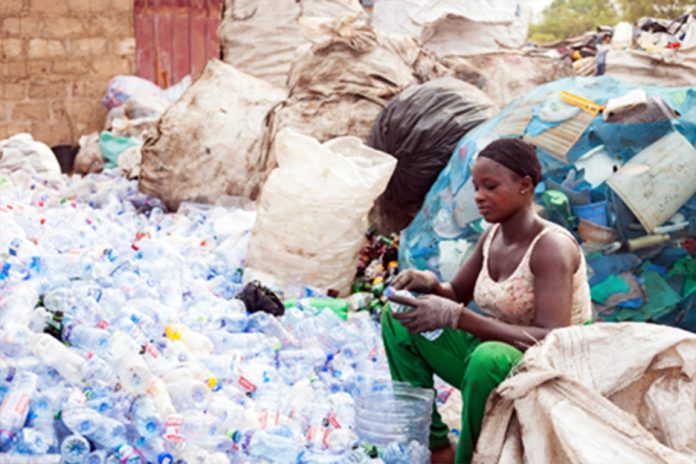Ghana faces an escalating challenge with plastic waste. Every year, the country generates over 1.1 million tons of plastic waste, yet only about 9% is recycled, leaving the rest to clog waterways, overwhelm landfills, and harm ecosystems. Single-use plastics—such as bags, bottles, and wrappers—are among the most problematic, with their ubiquitous use exacerbating flooding, pollution, and microplastic contamination.
Despite this pressing challenge, an opportunity exists to transform waste into wealth. By embracing the principles of Circular Economy, and leveraging Public -Private Partnership (PPPs), Ghana can tackle its plastic crisis while creating jobs, fostering innovation, and bolstering the economy. It’s time to seize this opportunity to turn the tide on single-use plastics.
The Current Crisis
Plastic waste contributes significantly to Ghana’s environmental and public health issues:
Flooding: Plastics clog urban drainage systems, worsening floods during heavy rains. Accra experienced devastating floods in 2023, which experts partly attribute to blocked drains.
Marine Pollution: As estimated 37,000 tons of plastic waste enter Ghana’s waterways annually, threatening aquatic life and fishing communities.
Health Risks: Microplastics have infiltrated Ghana’s food chain, with studies revealing their presence in locally sold fish.
Plastic pollution also carries a steep economic cost. A 2021 report by the World Bank estimated that plastic pollution costs Ghana approximately $100 million annually in lost tourism revenue, fisheries production, and infrastructure damages.
Circular Economy: The Path to Wealth
The circular economy offers a paradigm shift, emphasizing the reuse, recycling, and redesign of plastics to extend their lifecycle and reduce waste. For Ghana, this means treating plastics not as disposable nuisance but as valuable resources.
Key initiatives could include:
Improved Waste Collection Systems: Only 38% of waste in the urban areas is collected regularly. Scaling waste collection services, particularly in informal settlements such as squatters and slums, is critical to reclaiming plastics for recycling.
Recycling Infrastructure Expansion: Ghana has a handful of largescale recycling facilities. Investment in modern recycling plants and smaller decentralized units can significantly increase recycling.
Eco-Product Development: Local innovators can turn recycled plastics into products like tiles, furniture, and fuel, adding economic value while reducing pollution.
Succes Stories from Around the World
Rwanda’s Plastic Ban is a good policy initiative. Since 2008, Rwanda has implemented one of the World’s strictest bans on plastic bags, replacing them with biodegradable alternatives. This initiative has not only improved waste management but has positioned Kigali as Africa’s cleanest city.
India’s Plastic roads is another good initiative to adopt. Over the years India has repurposed over 200,000 tons of plastic waste into durable road materials, improving infrastructure while diverting waste from landfills. Ghana, where roads often suffer from potholes, could adapt this model to improve road quality and address plastic pollution.
Indonesia’s Plastic for School fees initiative is another model to pay attention to. In Surubaya, families can pay school fees by turning in plastic waste, incentivizing recycling and alleviating financial burdens. This concept could resonate strongly in Ghana, where education remains a key priority for many households.
Public -Private Partnership: A Catalyst for Change
Addressing Ghana’s plastic problem requires collaboration across sectors. PPPs can be the engine driving change by aligning government efforts with private sector innovation. Private Sector Innovators like Sesa Recycling, Coliba Ghana Ltd., recycling giants like the Integrated Recycling and Compost Plants (IRECOP) are already turning waste into eco-friendly products.
Government Policies can help attract more private innovators. The government can provide tax break to companies investing in sustainable materials and recycling technologies.
Community engagement is another string to pull all stakeholder on the table of discussing. Grassroots efforts such as incentivized recycling programs and public awareness campaigns can foster widespread participation.
Benefits Beyond the Environment
Turning plastic waste into wealth could unlock significant economic and social benefits for Ghana. The waste management sector could employ thousands, from collection to product manufacturing. Formalizing Ghana’s recycling industry could create over 5,000 jobs in the next five years. Recycling industries can reduce Ghana’s reliance on imported raw material while boosting exports of recycled products. Reducing plastic waste cuts emissions associated with its production and disposal, helping Ghana meets its Nationally Determined Contributions (NDCs) under the Paris Agreement from 2020 to 2030.
A Call to Action
The time to act is now. Ghana has the opportunity to set and example for Africa and the world by turning its plastic crisis into an economic advantage. COP29 showcased the potential of partnerships in addressing climate challenges. Ghana must now channel that momentum into action. This can be possible by investing in the waste management infrastructure; enforcing regulations that promote circular economy practices and the platform for private innovators to develop scalable, sustainable solutions in the country’s green economy.
Plastic waste is not just an environmental threat, it is an untapped resource. By adopting bold policies, fostering partnerships, and prioritizing innovation, Ghana can lead a transformative shift from waste to wealth.
By:
David Karikari
MSc. Ecology and Nature Management
People’s Friendship University (RUDN)
Moscow, RUSSIA
The views expressed in this article are the author’s own and do not necessarily reflect The Chronicle’s stance.









